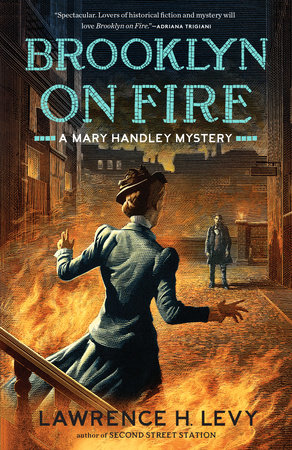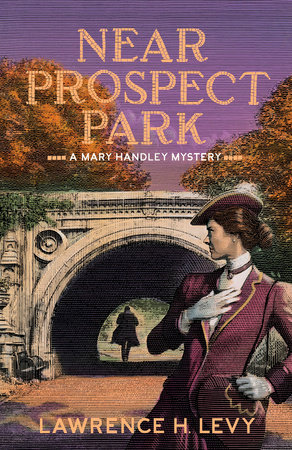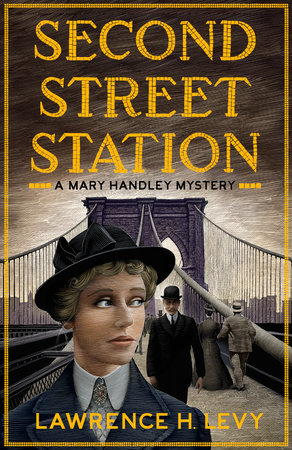Excerpt
Brooklyn on Fire
PROLOGUE
It took quite some time for the old lady to undo the mess her friends had wrought. Vicky and Albert had done the unthinkable by having a domestic spat in front of her, a physi- cal one, too, and right in the middle of her living room. Any- one else would have been banished from her home, but Vicky and Albert were such close friends they had become family. And family was always given a certain leeway. Besides, the old lady was alone now, a widow for some time. She was well into her seventh decade, sixty-four years old to be exact, and even though it was 1890 and improvements in medicine seemed to occur daily, she was painfully aware she had out- lived most of her contemporaries. Vicky and Albert were all she had left.
Their spat had strewn newspapers every which way, but the old lady had corrected that. She carefully perused her work; ten years of her beloved
Brooklyn Daily Eagle, in four- month stacks, approximately one hundred and twenty in each, spaced evenly on her living room floor in chronological order. The old lady took great pride in the fact that, at any moment, she could relive the major events of any specific day over the past decade—not that she had done so as of yet, but it was available to her and that was the important thing. She smiled and tossed some of her long, gray hair off her cheek to its proper resting place on her back. It was almost down to her waist by now. Years ago, she had given up frivolous things like haircuts and makeup. Her skin was wrinkled, her teeth yellow, and her dresses ancient, but who did she need to impress? Certainly not Vicky and Albert. They were family, and
occasionally family needed to be corrected.
“You two are incorrigible. When I saw what you had done, I was beside myself.”
“You’re always beside yourself,” snapped back Vicky in her high yet haughty voice.
“There must be a hundred of you by now,” Albert added. His voice was deeper, with a deliberate cadence, almost a monotone.
“Probably closer to a thousand,” the old lady admitted. Vicky and Albert could always defuse a tense situation, and the old lady could never stay mad at them.
She glanced at her coffin clock and saw it was inching toward five p.m. She had promised Vicky and Albert she would prepare a special dinner for the three of them, and at the stroke of five, she would start the process. The old lady was on a strict schedule.
“Without a schedule, all that is left is chaos,” she had often said.
“And chaos is the enemy of civilized people,” Albert would always reply.
“Have I ever told you how very intelligent you are, Albert?” the old lady would say, complimenting him, and Vicky would inevitably react.
“Of course he’s intelligent. Do you think I would marry an idiot?”
And the old lady would laugh every time. Vicky and Al- bert were younger than her, but the old lady didn’t know their exact age. They were clearly well into midlife, but their behavior was much more youthful, and that energy seeped into her old bones by osmosis, a word her husband had taught her that was invented by some Frenchman. She truly missed her husband and her son, both of whom had been felled by a cholera epidemic in 1871. They had survived the Civil War only to be erased by a bacterium, an infernal bug, and she lived with that heartbreaking irony every day, never letting it go.
The coffin clock struck five.
“Ah, it’s time!” the old lady exclaimed. She patted the clock as if thanking it for the reminder, and some of the dust that covered it flew into the air.
Although it was daytime, it was dark inside. The shades were drawn, and the only light came from two small kero- sene lamps. The old lady’s house was large, but her volu- minous collections made it seem cramped. As they carefully navigated their way around the newspapers, past the boxes of porcelain dolls and tea canisters, and into the dining room, where years of mail smothered the table, the old lady mused about coffin clocks.
“Can you believe the imbeciles out there are calling them grandfather clocks? They’re tall, rectangular, and made of wood, like a coffin. What that has to do with a grandfather is beyond me, unless you’re burying the old fool.”
They all agreed. The world had definitely gone mad. Danger and disrespect ruled. The pages of the
Brooklyn Daily Eagle were filled with evidence of a dying culture: robberies, murders, young people being allowed to marry whomever they wanted. Everyone knew that “young” was synonymous with “dim-witted” and if left to their own devices, the na- tion’s youth would most certainly lead them down the path to hell. That was why the old lady decided to withdraw from society, if you could call it that these days. It didn’t matter that she lived in Clinton Hill, one of the best neighborhoods in Brooklyn. According to her, no place was safe. She had her grocer deliver staples and her butcher deliver meat. Each time they did, she gave them a list of what she wanted next. Her only concession to the modern world was a telephone she had installed in case of an emergency.
As the three of them entered the kitchen, the old lady reached for one of the many pots that filled the sink and counters. That’s when she heard it.
“What was that?” she asked as she turned toward Vicky and Albert, who were looking in the direction of the noise. “You heard it too, didn’t you?”
Then it happened again. It was a loud clank followed by what sounded like a scrape.
“It’s not the grocer,” the old lady remarked, full of concern. “He delivered yesterday.”
There was a third clank and scrape, then, seconds later, a pounding on the front door. The three of them flinched at the loud sound, fear of the unknown racing through their brains. They all stood still for another moment, not sure what to do.
Another pounding, even louder.
This time the old lady marched out of the kitchen, through the dining room, and into the living room as if she were about to take decisive action. Vicky and Albert paused, then followed.
Yet another pounding, the loudest yet. The three of them halted immediately.
The old lady had had enough. “There is a horrific beast out there that is planning our demise, and I won’t have it.” She walked to the telephone and picked up the receiver. “Hello, operator, get me the police, and do hurry.”
There was an eerie silence as she waited on the telephone. No more pounding.
“Of course I’ll hold on, but understand, this is a grave situation.”
Suddenly, coming from outside the front door, a man’s screams shot through the room. “Oh, oh, oh, no-o-o-o!” It was shortly followed by the sound of scraping and clanging metal, a crash, and then a thud. Seconds later, the man began moaning in a low, sorrowful voice. The old lady clung to the receiver and stared at it as if willing someone at the police station to speak up.
“O-o-o-oh, o-o-o-oh!” the man continued. In spite of her resolve, she couldn’t help being curious. The old lady set down the receiver, went to the right of the door by an entry window, and slowly bent back a tiny portion of the shade, hoping to sneak a peek without being noticed. What she saw astonished her.
Limestone covered her front courtyard and lying on it was a small man, about five foot six or so, with a metal brace covering his entire left leg. Next to him was the object over which he had probably tripped—a three-foot stone statue of an angel whose head was now separated from its body. The man was still moaning, the volume of which ranged from hushed, almost melodious tones to loud outbursts. The old lady felt relieved and foolish all at once.
“It’s a poor cripple. I can’t believe we’ve been fretting over a cripple,” she said.
“O-o-oh, o-o-o-oh.” The man’s voice seeped into the house like a cold, wet draft.
The old lady turned to Vicky and Albert. “Stop giving me those sorrowful looks. There will be somebody along soon enough,” she reasoned.
“Consider the consequences,” Vicky said. “He fell on your property and he could sue you. Which is worse—helping him now or paying him later?”
The old lady had to admit that Vicky made sense, but the task ahead of her was daunting. The last time she had ven- tured outside was three years before, when she was stricken with a bout of pneumonia. Two strong men carried her out on a stretcher and drove her to the hospital in a carriage.
This is different, she thought.
The old lady took a deep breath, then slowly opened the front door, the hinges creaking from years of neglect. She stuck out her left foot, carefully pointing it downward like a dancer and setting the tip of her shoe on the limestone, then quickly removing it, as if testing the temperature of the water at a bathhouse. Feeling bolder, she ventured outside one small step as Vicky and Albert watched intently.
“Sir,” she softly called to him. There was no answer. He just continued to moan in a low, almost whiny tone. “Sir, do you need medical assistance? Shall I call a doctor?”
But there was still no answer, and the moaning increased. She decided to take a different, more aggressive tack. She stepped toward him. “Now, look here. You can’t lie in my entryway all day whimpering. What will the neighbors think? Besides, you broke my statue and—”
Before she could finish, he sat up with amazing swiftness and grabbed her around the waist. “Gotcha,” he said.
It was then that she first noticed the massive muscles bulging from his arms, the thickness of his chest, and the wild look in his eyes. She was in shock for a brief moment, but it was long enough. In no time, he was on his feet, one arm around her waist, the other covering her mouth as he lifted her in the air. She struggled, but he was much too strong. Her legs flailed helplessly as he carried her inside her house, the clanging of his metal leg brace ever present.
The old lady was not one to surrender. She kicked walls and slapped wildly at him. Several items—a vase, the tele- phone, a small table—were knocked over as he dragged her further into the house, but even she knew this was one fight she would not win, not without help.
Vicky and Albert saw their friend in trouble. Albert immediately jumped on the man’s back, but he too was no match for him. With a violent shake of his powerful body, the man easily dislodged Albert, then kicked him very hard with his one good leg, sending Albert reeling across the room. The man turned back to the old lady. He leaned her over a stack of the
Brooklyn Daily Eagle and started choking her.
Suddenly, the voice of a man with an Irish accent ema- nated from the telephone receiver on the floor. Bored, he was in midyawn. “Hello, this is the police. What can I do for ya? Hello?”
Vicky ran to the receiver, but with the old lady silenced, she couldn’t manage much. She stared at it quizzically as she stretched her long feline body. Albert joined her, then licked his right front paw, which had been injured when he was knocked across the room. The old lady had assigned them names in honor of her two favorite monarchs, Queen Vic- toria and Prince Albert, but without her speaking for them, words would never come out of their mouths.
“Anyone there?” asked the male voice. There was a click, and the telephone went silent.
Vicky and Albert looked at each other, then at their friend, who by now was completely helpless. They knew there was nothing they could do as her body fell limp and lifeless.
Vicky turned to the open door. She saw a mouse charge inside, scampering toward the back of the house. She took off after it with Albert right behind her. After all, it was dinner- time, and they were on a schedule.







